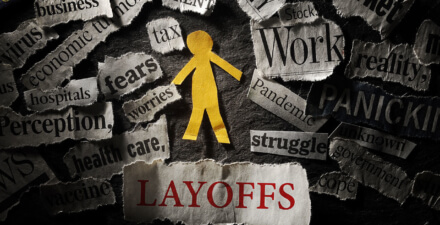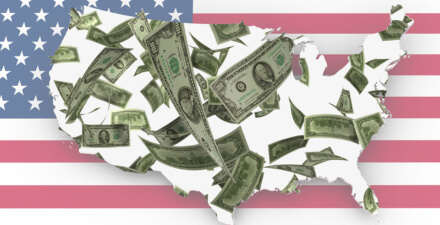Brad DeLong: Worthy reads on equitable growth, May 27-June 2, 2020
Worthy reads from Equitable Growth:
- The first and most crucial tasks of economic policy in the coronavirus public health crisis are to keep the supply shock from becoming a distributional shock and from becoming a demand shock as well. Successfully accomplishing these ranks requires, first, a great increase in social insurance spending. In a country as rich as the United States, nobody should be thrown in the poverty and destitution and have to deal with those problems as well as with the disease. The expansion of social insurance spending cannot be precisely targeted—lots of people will wind up getting more than their fair share. Too bad. It is inappropriate to make the best the enemy of the good and the attainable here, and to make it such that in order to prevent some from getting more than their share, we ensure that many who need support get much, much less. Somewhat similarly, the necessary expansion of aggregate demand in order to maintain and return the economy to as close to full employment as possible will attract, in fact has already attracted, critics. Preventing the coronavirus shock from becoming a major and prolonged demand shock will be inconsistent with the government not spending a lot more, will be inconsistent with a stability in the value of the national debt, will be inconsistent with avoiding a long run increase in taxes, may well be inconsistent with any form of normalizing interest rates to gratify rentiers, and might be inconsistent with maintaining a 2 percent-per-year Inflation target. Once again, the proper societal response would be: too bad. Our task is to arrange government finances so that Americans can do as much as possible, and not to hit what are sometimes artificial and are sometimes intermediate policy objectives targets. Heather Boushey discusses all of these considerations in Medium’s “Off-Kilter Podcast: Beyer + Boushey.”
- Amanda Fischer finds the acting Comptroller of the Currency going way beyond his competence, apparently in order to try to curry favor with his political masters. It is his job to help avoid unnecessary negative financial and economic fallout from necessary public health measures. It is not his job to try to put constraints that would prevent undertaking necessary and desirable public health measures. Check out her twitter thread on this issue, in which she says, “I have not seen such an opportunistic, inappropriate & frankly dangerous statement from a financial regulatory official maybe ever.”
- “Although the United States has entered a period of deepening social strife and economic depression, the Republicans who are in charge have neither the ideas nor the competence to do anything about it. The Democrats must start planning to lead, starting with a commitment to full employment.” I write in “What the Democrats Must Do.” I continue: “A federal commitment to full employment is not a new idea. The U.S. Employment Act of 1946 embraced the principle … The best response to … objections has always been John Maynard Keynes … ‘Anything we can do, we can afford.’ … Far from acting as an independent binding constraint on economic activities, the financial system exists precisely to support such activities. Finding useful jobs for willing jobseekers is surely something we are capable of doing. But adjusting the prevailing payments and financial structure to support full employment would of course have consequences … Supporting full employment … may … require higher and more progressive taxes … sky-high debt … that we divert demand from elite consumption to labor-intensive sectors such as public health. It also may require a large-scale labor-intensive public-works program. So be it. It’s time to make full employment our highest priority. Once we have done that, everything else will fall into place.”
Worthy reads not from Equitable Growth:
- Nick Bunker at Indeed’s Hiring Lab is closely watching the U.S. labor market in advance of this week’s employment report. The employment report will be one of our first significant clues as to the extent to which the coronavirus supply shock is turning into a demand shock as well, Read his “May 2020 Jobs Day Preview: Tracking the Spread of the Coronavirus Shock,” in which he writes: “The coronavirus has devastated the U.S. economy, leading to the destruction of over 21 million payroll jobs since February … The concentration of job losses so far is unsurprising, with the leisure and hospitality sector seeing total employment drop by almost 50 percent. Employment in the utilities sector has barely fallen, losing less than 1 percent of jobs. If the cumulative employment drop starts to pile up in utilities or other indirectly affected sectors, that could mean that more of the aggregate job loss is due to a systematic, economy-wide shock rather than a sector-specific one. Cumulative job loss will also put the eventual jobs recovery in a fuller context.”
- This is tremendously depressing. Stomping the coronavirus is now out of reach. This means that we are in “hammer & dance” land, trying to push cases out beyond the vaccine horizon and the better antivirals horizon, without incurring very large economic costs for little long run mortality benefit. Almost all other countries will do better. Read Kelsey Piper, “California coronavirus cases are rising despite early lockdown. Why are cases still rising?,” in which he writes: “One of the hopes for stay-at-home orders was that they would cause significant declines in new case numbers, not just get to a plateau. Once new cases become relatively rare, states could set up contact tracing, isolation of confirmed and possible cases, and other less restrictive strategies for combating the virus. That remains the best way out of lockdown, but those strategies are harder to implement when case numbers keep rising. The fact that California’s stay-home order didn’t decrease, or only slightly decreased, the number of new cases means that the road ahead will be a very hard one.”
- No, the coronavirus supply shock does not have to turn into a large demand shock, and even a large demand shock does not have to be followed by an anemic recovery. But this survey by FiveThirtyEight of me and my colleagues finds that nearly all of us think that we will do as bad a job of coping with this shock as we did with the subprime shock a little bit more than a decade ago. Check out “Don’t Expect A Quick Recovery. Our Survey Of Economists Says It Will Likely Take Years,” in which the co-authors write: “How quickly will the economy really be able to bounce back? How long will we be stuck with a double-digit unemployment rate and a host of other historically bad economic indicators?… So we partnered with the Initiative on Global Markets, a research center at the University of Chicago Booth School of Business, to survey a group of quantitative macroeconomic researchers who work in academic settings about the trajectory of the economic crisis. In consultation with Jonathan Wright of Johns Hopkins University and Allan Timmermann of the University of California, San Diego, two experts on macroeconomic forecasting, we asked the panel questions like what the shape of the recovery will resemble, when gross domestic product will return to its pre-crisis levels.”







